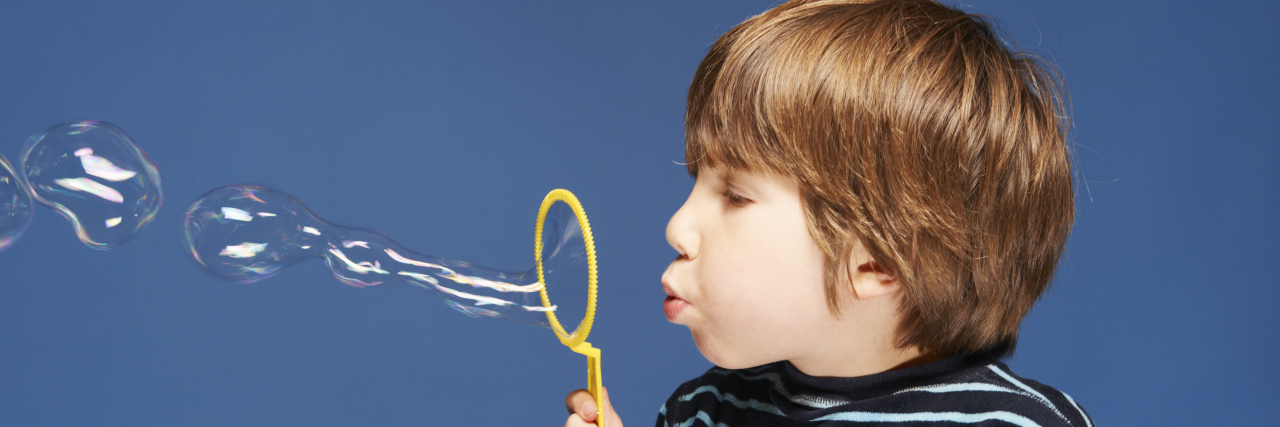Helping My Autistic Son Move Beyond a Saliva Obsession Amid the Coronavirus Pandemic
Amid a global pandemic of a virus primarily transmitted by respiratory droplets, my nearly 5-year-old autistic son has become obsessed with his saliva. Perfect timing. He blows raspberries when he pretends to roar like a dragon or when he’s blasting off a rocket. He spits when he’s angry. He is constantly chewing on everything which causes saliva to drip from his mouth. He spits on the floor until he’s created a puddle of saliva in which he plays with. I am quite certain if he contracts anything transmitted via respiratory droplets, everyone in our home will become infected.
These are the current steps we’ve taken in an attempt to address his new habit. We’ve given him permission to spit in the garbage can or toilet. We’ve put him in his room when he’s blowing raspberries while making sound effects and said, “Rockets can only blast off in your room.” We’ve separated ourselves from him when he has spat on one of us. Yet, the obsession continues.
In less than five minutes of research, Dr. Google told me this is a very common behavior of children on the autism spectrum for a variety of reasons. For one, it can be medically-related. Things such as enlarged adenoids or tonsils or oral motor weaknesses can cause children to produce more drool than the typical child. So if a child is producing more saliva than they can keep in their mouth, ruling out a medical reason is the first step.
However, once an underlying medical reason is ruled out, the behavior is then considered a maladaptive learned behavior. All behaviors serve a function. Typically those functions are to gain something (such as an item or attention), to avoid something (such as transitioning or an instruction), to communicate or to fill a sensory need or self-stimulation (stimming).
My son has had underlying medical issues ruled out, so that rules in maladaptive behavior. I believe my son is spitting due to a blend of sensory stimulation, communication and attention-seeking. Understanding this means now our role is to provide appropriate replacement behaviors, use positive reinforcement when he uses a replacement behavior, and to use consequences or purposeful ignoring when he spits for attention.
I am no behavior therapist, but my son has been in behavior therapy long enough and I’ve asked enough questions that I realize the road ahead is going to be a lot of work for my husband and me, but here is our new plan.
- Behavior Function – Communication: If he spits at us out of anger, we say nothing and immediately put him in his room for two minutes. After we tell him it is OK to be angry and to tell us you are angry, but spitting is not OK. It is yucky. We will tell him he can clinch his fists if he’s angry instead. (Consequence = Punishment and Replacement Behavior Taught)
- Behavior Function – Attention: If he spits to gain our attention, we say nothing and immediately put him in his room for two minutes. Afterwards, we instruct him to clean the spit and tell him if he needs something to ask us. (Consequence = Punishment and Replacement Behavior Taught)
- Behavior Function – Sensory: If we see him chewing on things and creating large amounts of saliva, we ignore the behavior and offer a drink, a snack or some other distraction. (Consequence = Ignore and Distraction)
- Behavior Function – Sensory: If we see him creating a pool of saliva on the floor we tell him it’s yucky, we instruct him to clean it and we offer him a drink, a snack or some other distraction. (Consequence = Punishment and Distraction)
- Behavior Function – Sensory: If we see him blowing raspberries creating saliva in making sound effects during play for rockets or dragons, etc., we will ignore the behavior and show him a replacement sound effect such as “vroom” for a rocket or “roar” for a dragon. (Consequence – Ignore and Replacement Behavior Taught)
If you have a child on the autism spectrum who is currently obsessed with saliva, I hope these suggestions can offer some hope in helping your child overcome this issue as well. I have my fingers crossed they help us!
“Sometimes those that challenge you the most teach you the best.” –Anonymous
For more on the coronavirus, check out the following stories from our community:
- Creative Activities to Try With Your Kids While We’re Isolated at Home
- What to Do When Your Child on the Autism Spectrum’s Routine Is Disrupted by the Coronavirus
- One Reason the COVID-19 Pandemic Might Be Extra Challenging for Autistic Adults
- 10 Face Masks People With Chronic Illness Recommend
- Why I’m Worried About Rationing If My Child With Down Syndrome Gets COVID-19
Getty image by Frank and Helena.

